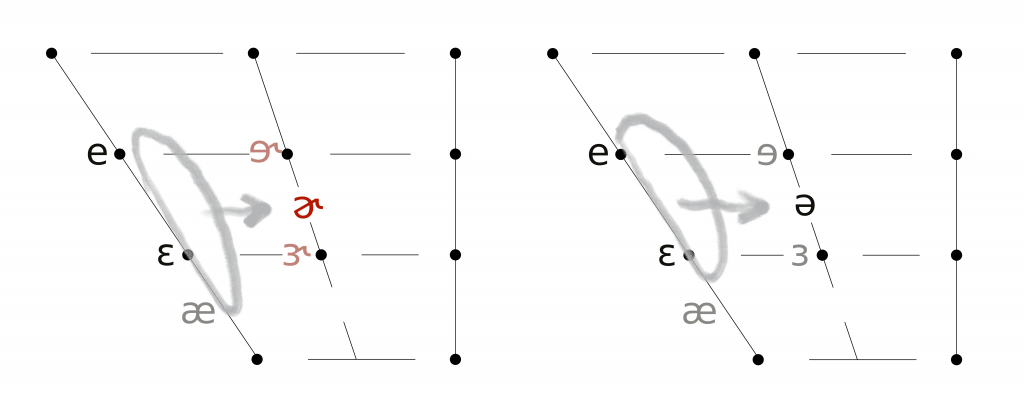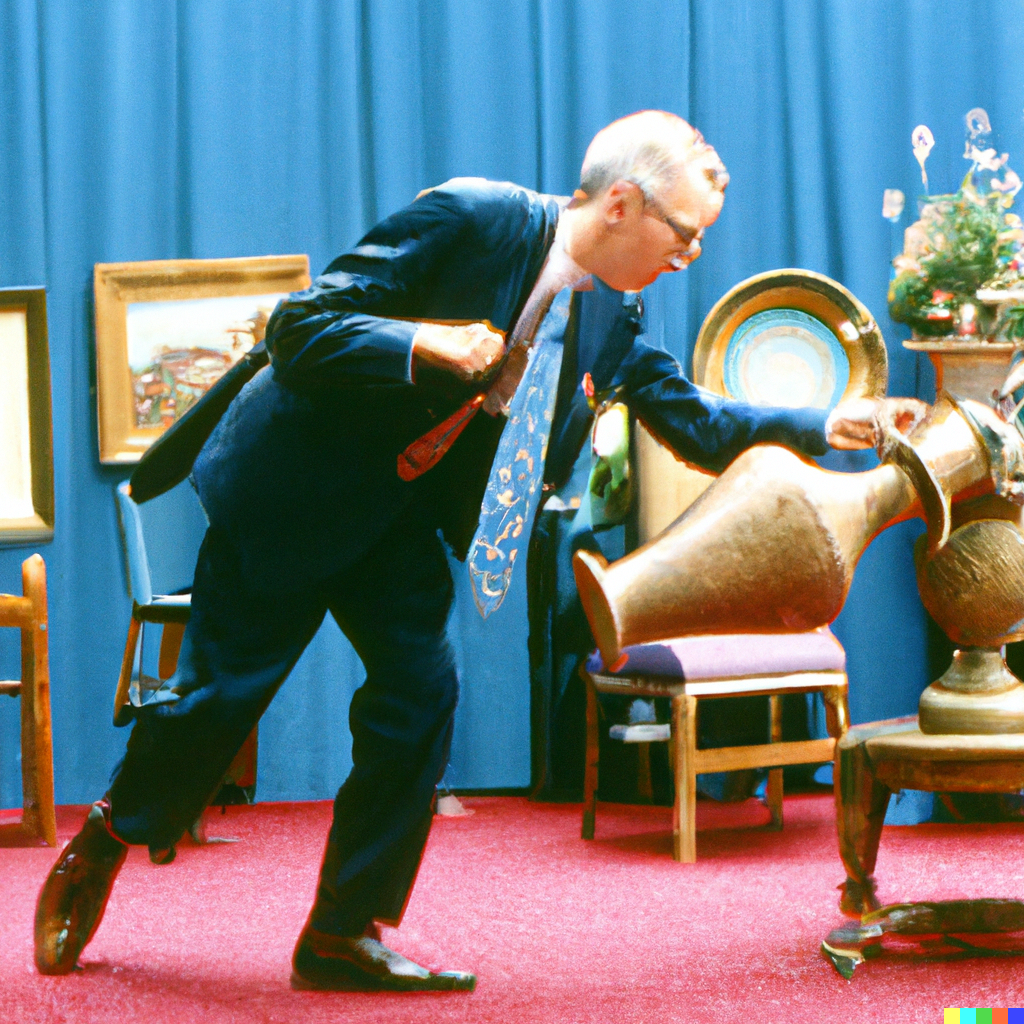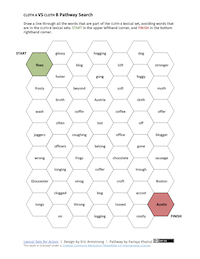20 The SQUARE Lexical Set
The square lexical set is part of the group known as the Centring Diphthongs, which go from the edge of the vowel space towards its center, towards schwa, with or without r-coloring. In this case, the nucleus of the diphthong is comparable to dress, with values in the range of [e ~ ɛ]. Depending on accent, the offglide can go from a relatively close position [eɘ̯˞/eɘ̯] to [ɛɚ̯/ɛə̯], to even [ea̯].

In non-rhotic accents, it is possible for smoothing to occur to centring diphthongs, so that they become merely the value of their nucleus. This means that, in some non-rhotic accents, a word like there might be fully articulated in its dictionary form as [ðɛə̯], but in rapid speech, it might be reduced to merely [ðɛ]. Of the 5 centring diphthongs (near, square, cure, north/force, and start), both cure and near are fairly resistant to this smoothing process, while the more open centring diphthongs are either smoothed in all contexts already (e.g. north/force [ɔ] and start [ɑ]), or are in the process of becoming so (square [ɛ]).
In many accents of North American English, words with ‹-arr›, as in Harry, guarantee, carried, marriage, which are trap +/r/ in other accents, are either square, or dress + /r/, such that words like marry and merry are homophones.
In some accents where square and dress + /r/ are not merged, e.g. Mary ≠ merry, it can be difficult to discern whether a word belongs to one group or the other in the environment before an intervocalic /r/ (an /r/ between two vowels). Wells calls the words in this situation square Ⓒ. Here’s how to recognize the two contexts (we’ll use Received Pronunciation as an example accent here, but this complication can happen in many other accents as well.) When [ɛ~e] precedes an intervocalic /r/ there are two options.
- The first is dress on its own, as a speaker might have in a word like merry, which is [ˈmɛɹi̽] in RP.
- The second is (of course) square, as you might have in a word like (ahem) Mary, [ˈmɛə̯ɹi̽], which is square Ⓒ. The schwa [ə] provides a kind of “speed-bump” after the [ɛ] that you can hear as a tiny “uh” between the nucleus and the consonant /r/.
In all cases where the dress vowel is preferred in accents of this type over square Ⓒ, the word is spelled with ‹er› or ‹err› as in very, America, ceremony, error, verify, necessary, terrace, therapy, Jeremy, terrible. Many (but not all) cases where square Ⓒ is appropriate have an ‹a› as part of the spelling, as in ‹ar-, air-, ear-› as in vary, Mary, various, preparing, fairy, dairy, repairing, wearing, bearing, tearing.
- 🕊 Free: does not require a following consonant, and can exist on its own
 A Centring Diphthong, that moves from the periphery towards the center (schwa).
A Centring Diphthong, that moves from the periphery towards the center (schwa).- in stressed and unstressed syllables
Spellings
Wells, in devising the square Lexical Set, created three subgroups that correspond to historical pronunciations. When accents split square, they tend to do so along these historical lines.
(a; c) are#, air#, ear#, eir#, ere#, ary; (b) arC
square Ⓐ: in Free syllables ‹are#, air#, ear#, eir#, ere#›, as in share, air, wear, their, there;
square Ⓑ: in Checked syllables ‹arC›, as in scarce (apparently the only example);
square Ⓒ: before intervocalic /r/ ‹arV, airV, earV, eirV, erV, aerV, ary›, as in various, fairy, bearing, Vieira, wherever, Bering, aerial*, scary.
Note that, while square Ⓑ’s inventory has literally only one very scarce member (the word scarce, 😃), through inflected endings of square Ⓐ words, such as share#d, share#s, it is possible to have square Ⓐ words checked by a consonant (i.e. acting like a square Ⓑ word.)
Pronunciations
The nucleus of square is frequently pronounced with an unrounded mid front vowel [ɛ ~ e], with an offglide towards the center of the mouth, [ɘ̯ ~ ə̯ ~ ɐ̯ ~ a̯] for a non-rhotic accent, or [ɘ̯˞ ~ ɚ̯ ~ ɝ̯] for a rhotic accent. In emphatic pronunciations, some accents allow for breaking into two syllables, for example [e.ə/e.ɚ] or even [ejə/ejɚ]. This is essentially the opposite process of smoothing described above, where non-rhotic square is reduced to a monophthong, e.g. [ɛ].
In many rhotic accents, square Ⓒ is merged with dress +/r/, and thus minimal pairs like dairy/Derry become homophones: [ˈdɛɹi̽]. For many accents where the nucleus of the vowel in these words is in the range of [e] (such as in Scotland and much of Ireland), the underlying phoneme is likely to be face +/r/, rather than square or dress+/r/.
square–near merger occurs in accents of the Caribbean, East Anglia, and South Carolina where near opens to [nɛə̯] and so sounds like square, e.g. cheer is spoken like chair. Meanwhile, in some New Zealand accent, there is a near–square merger, where square rises to be [skwɪə̯] and sounds like near, e.g. chair is spoken like cheer.
Personal Pronunciation: Preparation
To begin: do you pronounce /r/ after a vowel in words like bear=bare or bore=boar? If so, your accent is rhotic, you have r-coloring; if not, it is non-rhotic, you lack r-coloring. Take a moment to say square with the opposite of your pronunciation to be sure: try adding r-ishness to the end if you’re non-rhotic, and take it away if you are rhotic. How did you do that? Adding an /r/ sound usually means a curling or bunching action of the tongue; taking it away means inhibiting that /r/ impulse and (sometimes) includes relaxing your nucleus towards a neutral vowel in the center of your mouth. Or, you could just lengthen the nucleus. Compare your personal value in square Ⓐ words, such as bear=bare, hair=hare, wear=ware, fair=fare with someone else’s and take a moment to think about how they do what they do, and how it is similar or different from your own pronunciation.
- As a non-rhotic speaker, you should be able to discern whether you use a single action monophthong for square, or whether you offglide to some kind of mid-central(ish) vowel. If you do have an offglide, what vowel do you have for it? You should expect values somewhere in the range of [ɘ̯ ~ ə̯ ~ ɜ̯ ~ ɐ̯] for many speakers, but maybe it goes somewhere else?
- As a rhotic speaker, your offglide will have r-coloring. Try to figure out how open/close your offglide is, exploring options like [ɘ̯˞ ~ ɚ̯ ~ ɝ].
Not only should you discern where in the vowel space your offglide sits, but also the degree of r-coloring you have. Note that it is possible (though very rare) to have rhoticity through the entire vowel, with a rhotic monophthong, such as [ɛ ˞]. Depending on the degree of r-coloring, you can add one or more “wings” to indicate how much you have: [ɛɚ̯ ˞ ˞]. (We’ll look at other, more fine-grained options for denoting rhoticity in the Alternate Pronunciations section below.)
square & near: Before we dig into the nucleus of your square diphthong, let’s just ascertain that you don’t have a merger with near. Are the following minimal pairs the same, or different? If they’re different, then you don’t have a merger; if they’re the same, you do!
wary/weary, dairy/dearie, airing/earing, Eira/era
Now, let’s just check—if you do have a merger, do the pairs merge as square? Let’s check: is the beginning of the diphthong they share somewhere close to the vowel in fleece or kit (so they’re merged as near), or is it closer to the vowel in dress or face (which would mean that they sound like square)? If they match with square, we say you have a square–near merger, which is more commonly occurring. If they match with near, you have the near-square merger, which is much rarer among accents of English, globally speaking, happening almost exclusively in New Zealand.
square & nurse: Don’t settle in too soon, though—are the following minimal pairs the same, or different? If they’re different, then you don’t have a merger; if they’re the same, you’ve got one!
share/shirr, where=wear/were, air/er=err, hair/her, care/cur, fair/fir=fur
In some accents, such as you might hear in some accents in Ireland, Northern Ireland, Liverpool, and even in some varieties of African American English, square is merged with nurse. Frequently this is a mid-central vowel in the Northwest of England, where it’s realized as unrounded [ɜ ~ ə ~ ɘ] or rounded [ɞ ~ ɵ]. In the African American varieties that have it, it is [ɝ]. If you have this merger, you might review the personal pronunciation section for nurse, and then check the word list to see if there are any words that are listed as square that aren’t part of nurse. If so, are they dress words, or something else?
Meanwhile in Yorkshire—in England’s Northeast—it’s the other way around: nurse is merged with square, so it is realized as a mid-front vowel, [ ɛ ].
If they match: you have a merger, and so the challenge for you is to explore trying out a new pronunciation.
If they don’t match: you don’t have either merger, and so you’re lucky that you have the instinctual ability to distinguish between the two sets.
Is Breaking an Option? Imagine an emphatic “Go over THERE!” Does the diphthong in your speech break into two syllables? In more extreme situations, this will add a “yod” [j] between the nucleus and the offglide, as in [ˈðɛjɚ] in a rhotic accent, or [ˈðɛjə] in a non-rhotic one. Usually this is saved for people who have an underlying face vowel in their phonology, but not always. You don’t have to have the yod when it breaks, though: consider the difference between a pear that you eat, which is one syllable, and an elided version of “pay her,” a “pay ‘er,” with two syllables, but not a yod. Might the words pear and there break into two syllables, when spoken emphatically in phrases like “Not here, but there,” or “I want an apple, not a pear;” could they break into two syllables as they do in “pay-er”? If so, in those cases we’d transcribe them with a syllable break dot, as in [ˈpe.ɚ] or [ˈðe.ɚ].
Personal Pronunciation: Articulation Options
 ⚠︎ In my experience, when some people explore their square nucleus, they have a tendency to work in such an emphatic way that they go beyond their actual pronunciation to a kind of mental dictionary form, often in the realm of [e], even though they might normally pronounce the diphthong with a more “lax” pronunciation, that is more in the realm of [ɛ]. If you think this is the case for you, you might try recording your pronunciation of a word with square in the middle of a short phrase like “You got there quite quickly,” or “The square root of sixteen.” Though we’re looking at the italicized word, chose to emphasize the underlined word, which will guarantee that you won’t overemphasize the square word we want to listen to! Then, with the recording in hand, you can use software to slow it down so you can listen carefully to your personal pronunciation of square.
⚠︎ In my experience, when some people explore their square nucleus, they have a tendency to work in such an emphatic way that they go beyond their actual pronunciation to a kind of mental dictionary form, often in the realm of [e], even though they might normally pronounce the diphthong with a more “lax” pronunciation, that is more in the realm of [ɛ]. If you think this is the case for you, you might try recording your pronunciation of a word with square in the middle of a short phrase like “You got there quite quickly,” or “The square root of sixteen.” Though we’re looking at the italicized word, chose to emphasize the underlined word, which will guarantee that you won’t overemphasize the square word we want to listen to! Then, with the recording in hand, you can use software to slow it down so you can listen carefully to your personal pronunciation of square.Focus in on your nucleus now. Begin by exploring a couple of square Ⓐ words, such as hair=hare, air, their=there, share, where, care, Claire. Use an audio or video recorder to experiment on your own, or work with a classmate, friend, coach or teacher to identify how square in your speech compares with square in others’ speech. Try lengthening the beginning sound of your square vowel, and then attempt to subtly shift it around in the vowel space—up, forwards, down, and back—in tiny increments, before falling away to your offglide, whether it has r-coloring or not. As this diphthong begins in the most close front place, you should feel the top surface of the front of your tongue moving delicately up and down as you experiment while keeping your tongue tip behind your lower front teeth. Notice how the middle of the body of your tongue moves towards/away from your hard palate, making more or less space in the front of your mouth. Take it to the extreme as well, to the most extreme pronunciation you might be able to make before it becomes some other lexical set in your mind (probably near), and then fall off once more to your offglide. Where is your starting spot? Usually the beginning of square doesn’t have lip rounding, but some speakers find that they have some. Other speakers might feel like they have some lip spreading, especially in emphatic pronunciations. Compare square with near or start, and see how great the contrast is between the nuclei of these diphthongs.
Transcribing square: Decide which vowel symbol best suits the nucleus of your square Ⓐ subgroup: [e] or [ɛ] . Does it essentially have a quality that is associated with face, [e], or dress [ɛ]? Is it more forward [ɛ̟] or further back, [ɛ̠]? Is it more open [ɛ̞], or more close [e̝]?
If your square nucleus is… (use whichever vowel symbol is appropriate for you)
- high, use the raised diacritic [ e̝ ], a small T pointing up
- open, use the lowered diacritic [ ɛ̞ ], a small T pointing down
- pushed forward, use the advanced diacritic [ ɛ̟ ], a tiny plus sign +
- pulled back, use the retracted diacritic [ e̠], a tiny minus sign –
- if you add lip-spreadinɡ, use the lip spreadinɡ diacritic [ ɛ͍ ], a tiny two-headed arrow, which represents the lips spreading left and right
- if you add lip-rounding/corner advancement, use the lip rounding diacritic [ɜ̹], a tiny ɔ, which represents the lips projecting forward
If you have a rhotic square diphthong, your coda might be
- close-mid central, so use an r-colored reversed-e, [ ɘ˞ ]
- mid central, so use an r-colored (or “flying”) schwa [ ɚ ]
- open-mid central, so use an r-colored turned epsilon (or “flying three”), [ ɝ ]
If you have a non-rhotic square diphthong, your coda might be
- close-mid central, so use a reversed-e, [ ɘ ]
- mid central, so use a schwa [ ə ]
- open-mid central, so use a turned epsilon (or “three”), [ ɜ ]
Alternate Pronunciations
Experiment with the square Word Lists, Phrases and Sentences with the following nucleus options:
For those wanting to explore a near merger, see the near Lexical Set for further options.
For those wanting to explore a nurse merger, see the nurse Lexical Set for further options.
Off-glides: Now experiment with diphthongs that have off-glides that range from least open to most open [ ɘ˞, ɚ, ɝ ] for rhotic, and [ɘ, ə, ɜ, ɐ] for non-rhotic. Then, explore the offglides with a range of rhoticity, from no r-coloring to as much r-coloring as you can make, e.g. [ ⬚ɘ, ⬚ɘ˞1, ⬚ɘ˞2, ⬚ɘ˞3, ⬚ɘ˞4, ⬚ɘ˞5].
As you move the vowels in these directions, see whether that modified oral posture might inspire you to move the articulation of consonants and other vowels in the word in similar ways. Does it remind you of an accent other than your own?
Word Lists for square Ⓐin a Free Syllable, at the end of a word
-are
-air
-ear
-eir
-ere
Word Lists for square Ⓑ, sorted by the consonant that follows
⚠︎ Other than scarce, words are either proper nouns that are usually loan words, compounds, or inflected square Ⓐ words.
PLOSIVES
-p
-b
-t
-d
-k
-ɡ
AFFRICATES
-tʃ
-dʒ
NASALS
-m
-n
-ŋ
FRICATIVES
-θ
-ð
-f
-v
-s
-z
-ʃ
-ʒ
APPROXIMANTS
-l/ɫ
-ɹ
-w
Short Phrases
- Who are The Heir and the Spare?
- Carers, parents, and grandparents.
- Upstairs Downstairs.
- A square hairline.
- The chair of the librarians association.
- Swear with flair.
- A daring and precarious airshow.
- She aired out her prayer-rug.
- Which Molière character* wore a hair-shirt?
- They cared for their hairdo.
- Miss Sheard* and the laird were paired up.
- The caretaker repaired the air-conditioner.
- I carelessly dropped the heirloom, a true rarity.
- Mary wants to play Ariel, not Doll Tearsheet.
- Hergé’s invariably hilarious Tintin.

Sentences
Level 1
Short with 2-3 words, underlined
- Prepare to be scared by George Romero’s last film.
- He’s the fairest of all in Grand Prairie, Alberta.
- The bear bares his teeth before he tears into the salmon.
- Therefore “wherefore” means “why,” not “where!”
- Saying Pernod tastes good is a barefaced lie.
Level 2
Short with 4-5 words, underlined
- The mayor* won the staring contest fair and square.
- The hairsplitting comparison* between Pärt’s concerti is unfair.
- How did Gary* fare with the polar bear’s hairball?
- We declared we’d spare no expense at the Fairmont’s Claremont Club Hotel in Berkley.
- Tony Blair’s healthcare spending and the airborne deployment in Sierra Leone were both careless.
Level 3
Medium with 3-4 words, not underlined
- Pare the apples and slice the pears for the fruit squares, Claire.
- Some fairgoers rode their carriages* to the Maryland State Fair.
- An ancient Roman chair was discovered beneath the square in Salerno.
- Tilda drove carefully from the Inverness Airport to her home in Nairn.
- I’ll spare you the details of Ker’s affair with Sara.
Level 4
Hard with 4-6 words, not underlined
- The daredevil chased the Airedale terrier bareback on the mare.
- The Hungarian Baron who visited the Riviera was a vegetarian, and allergic to dairy.
- I daresay that Fairy Liquid’s rebranding as “Fair” for Pride month isn’t just careless “rainbow washing”.
- Contrary to rumour, “Cher Cares” Pandemic Initiative charity* helps areas of America that COVID is tearing apart .
- Contemporary precarious work is temporary, unfair, and often involuntary.
Mergers
near–square Merger: Sometimes called the chair-cheer merger, it can heard in New Zealand, East Anglia, the West Indies, Tidewater South Carolina, and in some (historical) accents of New York City. In New Zealand[1], in the early 1980’s, about 50% of speakers had distinct near and square Lexical Sets, while 19% of speakers spoke them as merged and sounding like square, and 32% of speakers said them merged and focused on near. By 1998, near had clearly won the battle: only 28% of speakers maintained a distinction, while 71% of speakers now used the near pronunciation, and only 1% used the square pronunciation for the merger.
In East Anglia, the two are traditionally merged in working class accents, though there may be still a very subtle, phonological difference where near is more open [nɛ], while square is slightly more close [ne].
Some New York City speakers in the twentieth century had a near–square merger with [ɪə̯], either in contrast with trap [æə̯], or in a 3-way bad-beard-bared merger with [ɪə̯].[2]
Though near in some southern regions of the US is more open, in the range of [ɛə̯/ɛɚ̯], often this is paralleled with a more open version of square with [æə̯/æɚ̯]. Meanwhile, in the Tidewater region of South Carolina, the merged near–square vowel is [ɛˑəˑ]. Some varieties of African American English also merge near–square with a vowel in the region of [eə̯].
Jamaican English has essentially the same vowel [eə̯] for its merger, though it depending on speaker status, may be more or less rhotic. Trinidad is more likely to have less rhoticity on its merger, and to have no offglide, [e]. In Barbados, where rhoticity is standard across all levels of the accent, we get [eɚ̯] for its merger of near–square.
If you have this merger, then try to differentiate the near and square words in this sentence. Experiment with near/square pairs such as:
[iə̯/eə̯, ɪə̯/ɛə̯, ɪː/ɛː, iɚ̯/eɚ̯, ɪɚ̯/ɛɚ].
-
- Clare wasn’t clear that she cut her fair hair here; that’s what I fear.
- The dear pair of Kieron and Karen dare to cheer from their chairs on the pier.
- “I swear I can hear a bear that way,” Jabby said as he steered us away from the woods.
- The cashier had to prepare to appear on a news story because of a recent lottery-ticket-winner-turned-billionaire.
- Even though they were scared, Valentina was proud to share she was queer after waiting many years to come out.
The dress+/r/-square Merger and the dress+/r/-trap+/r/ Merger are commonplace in much of North American English, and commonly referred to as the Merry-Mary-Mary Merger, though some regions have neither, or only one merger.
Experiment with these three set by making them match (if they’re not merged for you), or by differentiating them with these options:
dress+/r/, trap+/r/, square: [e̞/æ/eə̯, ɛ/a/e, ɛ̝/æ͍/ɛɚ̯]
There are minimal pairs for dress+/r/ vs. square: very/vary, merry/Mary, ferry/fairy=faerie, cherry/chary, Ferrer/fairer, Derry/dairy.
Minimal Pairs for dress+/r/ vs. trap+/r/ include: Perry/parry, berry=bury*/Barry=Barrie, terry/tarry, merry/marry, herald/Harold, perish/parish.
- The merry fairy named Mary took the ferry to marry hairy Harry in Paris.
- Terry and Barry Berry tarried before buying two very varied dairy farms in Derry.
- I was scared to be on the terrace as the floor was transparent and it was very narrow and precarious
- Gerald told Barry it was necessary that they prepare the ring bearer before the marriage ceremony.
- Apparently, Sharon, the librarian, made repairs for the book that was very terribly damaged.
nurse–square Merger, aka Fur-Fair: In Liverpool, Ulster, and some newer accents of Dublin, square words are merged with nurse with the vowel [ɜ] or [ɝ]. (Note that for some accents in East Yorkshire, the merger goes the other way, and nurse words are merged with square, [ɛ]. Minimal pairs/homophones include were/ware, her/hair, per/pair=pare, heard/haired, curr=Kerr/care, blurred/blared, fur/fair.
Experiment with making them match using these nurse options:
[ɘ˞, ɚ, ɝ, ɵ˞, ɞ˞] (rhotic), or [ɘ, ə, ɜ, ɵ, ɞ] (non-rhotic).
Make a distinction between them as nurse and square:
[ɘ˞/eɚ̯, ɚ/ɛ̝ɚ̯, ɝ/ɛ̞ɚ̯, ɵ˞/e̝ɚ̯, ɞ˞/ɛ̠ɝ̯] (rhotic), or [ɘ/e, ə/ɛ, ɜ/ɛ̞ə̯, ɵ/e̞ə̯, ɜɪ̯/ɛə̯] (non-rhotic)
- Blair, the furry pear-shaped fairy, blurred the line with her purple hair.
- The burley, red-haired mermaid’s mare barely heard the pair of purring cats.
- They shared third place at the burger eating contest at the fairground.
- The chairman was determined to implement fairness where employment was concerned.
Long trap Split, aka “Ash Tensing” (as ash is the name of the symbol [æ] typically used for trap), the vowel is “tensed,” with a closer articulation in the range of [ɛə̯, eə̯, ɪə̯]. The Long trap Split does seem like a near merger with non-rhotic square when a word like pad and a word like pared may become homophonous, [pɛə̯d]. The trap Split can occur in varieties of North American English before /n/ in words like man, voiceless fricatives like path, and nasals+obstruents, like dance, damp. In New Orleans’ “Yat” accent, and in the accents of New York City, Baltimore, Philadelphia and Boston, environments can also include syllable final /-b, -d, -dʒ, -n, -m, -f, -v, -s, -z, -θ, -ð, -ʃ, -ʒ, -ɡ, -ɹ, -l/. Note that each community has its own list of which environments are allowed, and even then many speakers within a given community will have their own idiosyncratic version of how the sounds should be distributed. Minimal pairs for this could include ban=bann/bairn, can/cairn, rabbit/rarebit, ad=add/aired, bad/Baird, cad/Caird, as/airs, Asher/Ayrshire, Chas/chairs, Bas/bares=bears, Alec/Ehrlich, rally/rarely.
Splits
There are no known Splits of the square Lexical Set.
Review
Pathway Puzzles
 Pathway Puzzles allow you to practice finding members of a lexical set. Choose the next cell with the FIRST lexical set word to make a pathway from the START of the puzzle down to the FINISH. Open the KEY document to see the solution, and check your work. Pathway Puzzles were created by Farisya Khairul, through support from a AMPD Minor Research Grant.
Pathway Puzzles allow you to practice finding members of a lexical set. Choose the next cell with the FIRST lexical set word to make a pathway from the START of the puzzle down to the FINISH. Open the KEY document to see the solution, and check your work. Pathway Puzzles were created by Farisya Khairul, through support from a AMPD Minor Research Grant.
A vowel that changes state, with a nucleus that begins on the periphery of the vowel space and moves toward a coda that is in the middle of the mouth, usually schwa /ə/. Here, we mean the sets NEAR, SQUARE, START, NORTH, FORCE, and CURE, whether they are rhotic or not. (US spelling: centering diphthong. )
Smoothing is the process whereby a diphthong becomes a monophthong, by having the coda or offglide be omitted. With centring diphthongs, the nucleus is then lengthened to about the same length as the diphthong used to take altogether. The opposite is "breaking".
When applied to a diphthong, "breaking" is a process where it becomes two syllables. When applied to a monophthong, it tends to mean diphthongization, where a mid-central schwa is added. The opposite is "smoothing"

